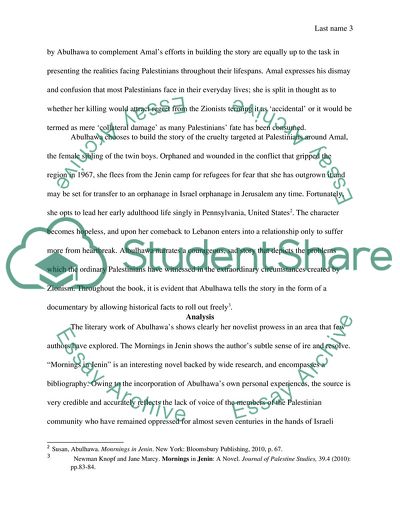Cite this document
(Susan Abulhawas Mornings in Jenin Book Report/Review Example | Topics and Well Written Essays - 2000 words, n.d.)
Susan Abulhawas Mornings in Jenin Book Report/Review Example | Topics and Well Written Essays - 2000 words. https://studentshare.org/history/1810286-book-essay-on-mornings-in-jenin-by-susan-abulhawa
Susan Abulhawas Mornings in Jenin Book Report/Review Example | Topics and Well Written Essays - 2000 words. https://studentshare.org/history/1810286-book-essay-on-mornings-in-jenin-by-susan-abulhawa
(Susan Abulhawas Mornings in Jenin Book Report/Review Example | Topics and Well Written Essays - 2000 Words)
Susan Abulhawas Mornings in Jenin Book Report/Review Example | Topics and Well Written Essays - 2000 Words. https://studentshare.org/history/1810286-book-essay-on-mornings-in-jenin-by-susan-abulhawa.
Susan Abulhawas Mornings in Jenin Book Report/Review Example | Topics and Well Written Essays - 2000 Words. https://studentshare.org/history/1810286-book-essay-on-mornings-in-jenin-by-susan-abulhawa.
“Susan Abulhawas Mornings in Jenin Book Report/Review Example | Topics and Well Written Essays - 2000 Words”. https://studentshare.org/history/1810286-book-essay-on-mornings-in-jenin-by-susan-abulhawa.


